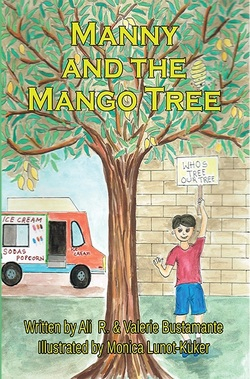Review: Manny and the Mango Tree

Manny and the Mango Tree by Ali R. & Valerie Bustamante. Illustrated by Monica Lunot-Kuker. Hard Ball Press, December 2014. Ages 4-8.
Even if lately she seems to love Minecraft more than anything in the world, getting my eight-year-old daughter to read isn’t an issue. What’s difficult is finding books for her that reflect our family’s values.
Both my partner and I are long-time labor activists. It’s one thing to drag Ruby to a union meeting because we can’t find childcare, but it’s another for her to be able to read children’s books about social justice.
So Ruby was thrilled when Labor Notes sent her Manny and the Mango Tree, and asked her to review it. We decided to interview one another about the book.
Marsha: Tell me about the story.
Ruby: The story is about a boy named Manny, and his friend Maria, who take care of a mango tree near their building. When the fruits are ripe the children want to pick them, but when they get to the mango tree, they see a sign that says, “Do not pick mangoes.” They are really disappointed. When they go back to Manny’s mom she tells them that if they make trouble some of the people in the building might get sent away because they don’t have immigration papers. Asking the Super (the building’s superintendent) nicely doesn’t get them anywhere, so Manny and Maria organize a protest with all the children in the building, and they have picket signs and they chant and make a lot of noise. They are even on TV. Because of the protest the Super decides they can each have one mango and they have a big party. Manny’s mom is very proud.
Ruby: Who are the main characters?
Marsha: Definitely all the children, with Manny and Maria providing amazing leadership. And Manny’s mom, who was supportive while providing some helpful feedback. The Super helped, too, because he got the kids angry and anger is often a powerful motivator. I like that the book shows that it takes a lot of different people to fight back successfully and that everyone can play a role.
Marsha: How did all the kids find out about the protest?
Ruby: Manny and Maria went around the building knocking on every door and telling each kid about the protest. They probably talked about how it wasn’t fair that they couldn’t eat the mangoes after they had taken such good care of the tree and how a protest might force the Super to change his mind. I think the protest was so big because the kids trusted another kid asking them to do something together.
Marsha: What else could Manny and Maria have done to convince the Super to let them pick the mangoes?
Ruby: I suppose they could have stolen the mangoes, but then the Super would have known that it was Manny and Maria who took the fruits. By asking everyone to protest they knew it would be harder for the Super to say no.

SUPPORT LABOR NOTES
BECOME A MONTHLY DONOR
Give $10 a month or more and get our "Fight the Boss, Build the Union" T-shirt.
Ruby: Do you think making trouble is scary?
Marsha: Yes, it can be. We’re always told to follow the laws or do what the boss says, even when those laws aren’t fair or the boss is being mean. And if you overcome your fear but then you lose—because sometimes the odds are just stacked against us—it’s disappointing. Thankfully we can learn a lot from other troublemakers and increase our chances of winning. And then it’s worth it, because those celebration parties, when you do win, make everyone feel really powerful.
Marsha: Why is Manny’s mother worried about immigration?
Ruby: Because people could get deported and it would split up kids from their parents—which happens all the time and is really sad and wrong. People without papers will protest less. They won’t fight back when the boss doesn’t pay them. But people without papers are still human and they still need to eat and have a place to live. I don’t understand why papers are so important.
Ruby: What do you like about the story?
Marsha: I liked that the kids didn’t take no for an answer and they organized this protest all by themselves. I can imagine that they learned a lot from the experience and will go on to fight for better lives for themselves and their parents. I thought it was great to read a story where children are the main actors and are learning to be troublemakers. But it was also powerful that they found a way to protest without endangering people who could lose a lot if the protest had gotten out of hand.
Ruby: What did you not like about the story?
Marsha: That silly people think they cannot share a tasty gift from nature, such as mangoes from a tree that the children took care of themselves.
Marsha: What did you think of the pictures?
Ruby: I thought they described the story really well. If I had lived in that building I would have helped them and joined in the protest.





